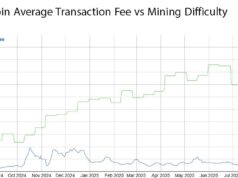On July 11, French lawmakers submitted a bill to the National Assembly that will run for five years, with the goal of using excess energy—mostly from nuclear and renewable sources—to mine bitcoin.
France produces more energy than it can use, especially during off-peak hours or when renewable energy sources like wind and solar are producing more than needed. Storing this excess energy is hard and expensive, so producers are forced to sell it at a loss.
In 2024, France lost around €80 million because of negative electricity prices. In March 2025, the French grid operator had to pay nearly €12,000 per megawatt-hour to get rid of the excess energy.
This new proposal suggests a better way to use that power, which will turn the loss into profit.
“Electricity producers are often compelled to sell overproduced energy at a loss due to a lack of storage, which constitutes an ‘unacceptable economic and energy loss’,” the proposal says.
Bitcoin mining, in which specialized computers race to find the next block, helps run and secure the Bitcoin blockchain, and rewards the miners with digital currency. It uses a lot of energy, which has raised environmental concerns in the past.
Related: Bitcoin Mining Clean Energy and Grid Balance | ERCOT Study
France now wants to flip the script. By using clean, carbon-free nuclear power, the country wants to become the world leader in sustainable bitcoin mining.
With this idea, lawmakers are trying to turn a problem into an opportunity.
According to the bill, one gigawatt of excess energy could generate between $100 million and $150 million per year. The data comes from the Association for the Development of Digital Assets (ADAN).
This revenue could support the nuclear infrastructure and create a new industry around Bitcoin. Lawmakers also believe it could stabilize the grid and reduce wear and tear on nuclear power plants, which are not designed to constantly adjust their output.
Bitcoin is the perfect solution. Bitcoin mining farms, which can be designed and deployed at any size, can be turned off and on with the flip of a switch. This creates the ideal tool to manage electricity use in the power grids.
The plan is to build data centers near power plants, especially in abandoned or underused industrial sites. This keeps the mining operations close to the energy source and doesn’t overload the existing grid.
By putting the mining farms in old factories or unused buildings, the project could also help with local development and reindustrialization.
Bitcoin mining machines generate a lot of heat. Normally, that heat goes to waste. But the French lawmakers want to capture it and reuse it to heat homes, greenhouses, or industrial buildings.
This isn’t just a theory. Similar projects are already happening in Finland, Norway and Sweden. In Finland, one 2-megawatt mining farm provides heat for 11,000 homes. In Norway, excess heat is used to dry timber and warm aquaculture greenhouses.
The idea has support, but it’s not without controversy.
Some are worried about the energy consumption of bitcoin mining, even when using clean power. Others are skeptical because the bill comes from members of the National Rally party, a far-right political group.
In June 2025, a similar amendment was rejected due to parliamentary rules. Now the new proposal has to pass more political tests.
Still, France’s Minister of Digital Affairs, Clara Chappaz has shown openness. “We must examine this without ideology, asking the right questions,” she said.





